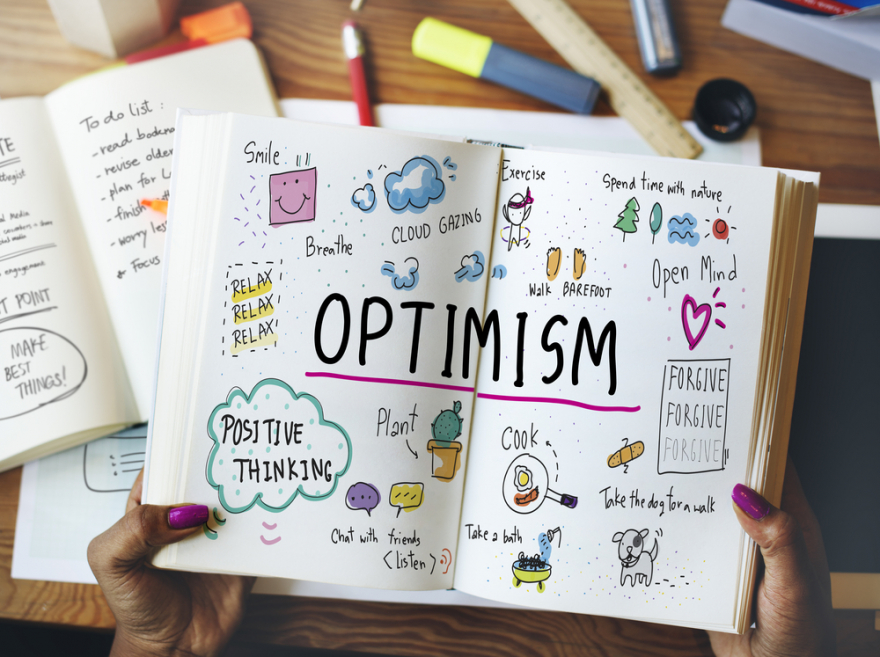|
Cultivate Optimism Each Day with These Six Practices
Rev. Dr. Kitty Boitnott, NBCT, RScP
Heart-Centered Career Transition and Job Search Coach | Life Strategies and Stress Management Coaaching

With so much negative news these days, you may be having trouble staying optimistic and upbeat. It can be way too easy to get sucked into all the hate and negativity that you hear on television, Twitter, Facebook, and other platforms you may frequent.
What's happening in the world around us right now can create a lot of anxiety and fear. And anxiety and fear don't leave much room for optimism, unfortunately.
Did you know that optimism isn't an innate quality?
You aren't born with an optimism gene. I believe that optimism and pessimism can be part of one's inherent temperamental outlook. But optimism and pessimism are mainly ways of viewing yourself and the world. You can either look at them from a positive point of view or a negative one.
Cultivating optimism is a practice much like the practice of gratitude. You can choose to look at things from a positive, optimistic place or a negative place.
But you choose.

If optimism is hard to find right now during these dark days of the pandemic, economic uncertainty, and social unrest, you may want to develop a practice to help you. As a practice, you can work on taking small daily actions to help you make optimism a habit.
Building any kind of habit requires daily attention and action. That's why I am offering the following activities for your consideration.
Try one or more of these six (6) habits to help you build a strong, optimistic point of view of your life and the world at large.
1. Keep a journal.
Journaling allows you to process the events that occur in your life. It can also help you develop a different perspective on those events.
Journaling encourages self-reflection. It also captures insights into your thinking and behavior.
You can write down what happened during your day. Use your journal to document the things that happen to you both large and small.
Use it to analyze how those certain situations and experiences made you feel. Journaling can help you develop some distance and objectivity about a situation that may be bothering you.
Don’t just record the good things (a promotion, a presentation, or a meeting that went well) that happen to you. It's okay--perhaps even better in the long run--to write down the things that didn’t go so well.
Reflect on what happened, how you dealt with it, and what you might do differently next time.
2. Laugh as often as you can.
There hasn't been a lot to laugh about lately. But that's all the more reason to look for things that you can laugh about, don't you think?
Find an old movie or TV series on one of the million streaming platforms that will help you connect with what makes you laugh.
When they say that laughter is the best medicine, they aren't kidding.

There are documented cases of people who actually cured themselves of illnesses by watching funny movies all day.
Studies show that laughter is, indeed, strong medicine that can lessen your stress because it relaxes the whole body.
Laughter not only decreases stress hormones, but it also increases immune cells and triggers the release of endorphins.
It also protects the heart because it increases blood flow and improves the function of blood vessels.
And the list goes on.
I hadn't realized how long it had been since I had had a good, hard, belly laugh until a few weeks ago, when I saw something on Twitter that made me quite literally, "laugh out loud."
It felt really good.
I instantly felt the tension drain out of my body, and I realized it had been days, if not weeks. since I had laughed that hard.
Don't believe that laughing can make a difference? Try it. And I don't mean a giggle. I mean a full, deep, belly laugh. The kind that makes you feel good right down to your toes.
3. Write to your future self.

If your present situation is less than you want it to be, how about writing a letter to your future self about how you hope to come through all this?
And while you are at it, write about what you want to have accomplished when you get to that time in the future when the pandemic is a distant memory.
You will have survived the economic hardship and come through it on the other side more financially stable than you could have ever imagined.
The social unrest has passed and has brought about peace and understanding that eluded us for generations.
Your future self is doing quite well, and while it may be hard to envision how it can all work out okay right now, believing that it can and will work out okay is the point.
So, write about that.
4. Keep a list of kindnesses extended to you AND kindnesses that you have extended to others.
Write down everything you experience as a kindness that you either receive or extend to a friend, a neighbor, or a stranger.
Even little things count, like opening a door for someone or letting them go first in the line at the grocery store. You’ll be surprised at how quickly they mount up.
And your ever-lengthening list will give you a different perspective on things.
It is the small kindnesses, in fact, that can make the biggest differences in people's lives. And the thing is, we never know exactly how they play out.
You can never know how a small kindness you did for someone can make a big difference in the life of one who is struggling.
The entire movie's storyline is built on the difference that small kindnesses that the main character, George Bailey, extended made a difference in the lives of people in a whole town.
His kindnesses were never forgotten, either, by those he had helped. He didn't remember them, perhaps, but they did.
Keeping a kindness list can help you remember the importance of being kind in your everyday interactions with others.
It can also help you remember the kindnesses that were extended to you when you feel down.
5. Say thank you throughout your day.
"Thank you" may well be two of the most underrated words in the dictionary. They cost nothing, but they can mean a great deal.
If someone holds a door open for you, have the courtesy to say, "Thank you."
If you drop something that someone else picks up for you, say, "Thank you."
I make it a practice to thank the delivery people who come to my door with deliveries from Amazon, UPS, and DoorDash. They always wave back in acknowledgment when I do.
Saying "thank you" costs you nothing, but it can mean a lot. It goes along with that list of kindnesses that you can keep helping build your optimism.
Make the choice to develop and maintain an optimistic outlook in your life in spite of outward appearances right now.
Do this every morning when you wake up to face a new day.
Decide that today is going to be a great day.
Everyone has some level of suffering in their life. No one gets a free pass. Each one of us has sadness and disappointment in our lives.
Choosing to be optimistic will make it easier to bounce back from the bad times and to enjoy and be certain of the good times.
So, why not start today creating a practice that will help you build your optimism? It can only help, right?
Until next time.
|